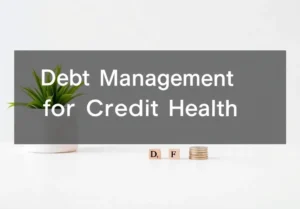
Debt can feel overwhelming, yet many find a solution in debt consolidation. This strategy combines multiple debts into one payment, making it appealing at first glance. But is it truly the best route to take?
Debt consolidation can simplify your finances by reducing the number of monthly payments and potentially lowering interest rates. However, it’s essential to weigh the benefits against the risks of added fees and a longer repayment period. There are layers to this financial strategy that could impact your future, so let’s unpack what a full understanding involves.
Key Takeaways:
- Debt consolidation can reduce the number of monthly payments and potentially lower interest rates, simplifying your financial management.
- Weigh the pros and cons carefully, as fees and longer repayment terms can offset initial benefits.
- Effective debt consolidation requires a commitment to improved financial habits to avoid falling back into debt.
Disclaimer: Information on this blog is for general educational purposes only and does not constitute personalized financial advice. Always consult a qualified financial advisor before making any financial choices.
What is Debt Consolidation?
Debt consolidation is a financial strategy that combines multiple debts into a single loan, typically with a lower interest rate or more manageable terms. It’s aimed at simplifying payments; instead of juggling various bills, you make just one monthly payment. This can be particularly beneficial for those who are overwhelmed by multiple debts. Think of it as putting all your financial obligations into one basket, enabling you to tackle your debt more efficiently.
This process usually involves taking out a new loan—often a personal loan or a home equity loan—to pay off existing debts like credit cards, medical bills, or other loans. It’s like having a single point of contact for your financial commitments, which can ease the stress of managing different due dates and amounts.
If you’re considering this route, remember that successful debt consolidation doesn’t just mean shifting your debt around. It’s crucial to focus on your spending habits moving forward to ensure you don’t end up in the same situation again.
How Does Debt Consolidation Work?
Consolidating debt can take different forms, tailored to fit your needs. Here’s a breakdown of how it generally operates:
Personal Loans : These are unsecured loans typically offered by banks or credit unions. You borrow a lump sum and use it to pay off your debts. You’ll then repay the loan with a fixed monthly payment, often over a three to five-year term. The key benefit here is usually a lower interest rate compared to credit cards.
Balance Transfers : This method involves moving your credit card debt to a new card with a 0% introductory rate. You’ll often pay a small fee for the transfer, but it can save you money on interest in the long run. However, it’s important to pay off the balance before the promotional period ends to avoid hefty interest charges.
Home Equity Loans : If you own a home and have built up equity, you might consider this option. You can borrow against your home’s value, potentially getting a lower interest rate. However, remember that this type of loan puts your home at risk if you fail to make payments.
Debt Management Plans (DMP) : Sometimes offered by credit counseling agencies, a DMP involves working with a professional who negotiates lower interest rates and fees with creditors. You’ll make a single monthly payment to the agency, which then disburses it to your creditors.
The beauty of these options lies in the ability to create a more streamlined repayment process, but it’s essential to choose wisely. Take into account your credit score, as it influences the interest rates you’ll receive. Additionally, assess any associated fees for loans or balance transfers.
Finally, be sure to implement a budget post-consolidation. It’s all too easy to fall back into old habits, and having a solid plan can help steer you clear of future financial woes.
What Are the Pros of Debt Consolidation?
Debt consolidation can really simplify your financial life. By combining multiple debts into a single loan, you often enjoy reduced monthly payments. This can ease the strain on your budget, making it less stressful to manage your finances.
Another significant advantage is the potential for lower interest rates. Many borrowers can qualify for a personal loan with more favorable rates than what they’re currently facing, particularly if they have good credit. This reduction can lead to substantial savings over the life of the loan.
Convenience is another big plus; instead of juggling multiple payments with various due dates, you’ll just have one payment to keep track of. This streamlined approach can reduce confusion and the chance of missing a payment, which helps your credit score in the long run.
Additionally, many people find that debt consolidation encourages better financial habits. By focusing on a single loan, you’re less likely to incur new debts, as the urgency of repayment becomes clearer.
For those considering this path, one specific recommendation is to explore credit unions or local banks for consolidation loans. They often provide lower rates compared to larger banks, and they may offer personalized service to help you find the best option for your situation.
What Are the Cons of Debt Consolidation?
Proceed with caution; debt consolidation isn’t all sunshine and rainbows. One of the key concerns is that it can lead to longer repayment times. While your monthly payment might decrease, extending the loan term could mean you end up paying more interest over time.
Then there are the fees associated with consolidation loans. Originations fees, balance transfer fees, and even closing costs can pile up, potentially overshadowing the benefits of lower interest rates. It’s crucial to read the fine print and do the math before diving in.
Another serious risk is the temptation to rack up more debt. Some find themselves falling back into old habits, using available credit lines again, which can set them back even further. If you’re not mindful, you could end up worse off than when you started.
In addition to these concerns, it’s worth considering the impact on your credit score. Although consolidating debt can improve your score by reducing utilization ratios, applying for new credit can temporarily lower it. Balancing these outcomes is essential for maintaining financial health.
Be sure to have a solid repayment plan in place, and keep a watchful eye on spending habits to avoid the pitfalls that often accompany debt consolidation.
Who Should Consider Debt Consolidation?
If you’re juggling multiple debts with varying interest rates and due dates, debt consolidation might be a smart choice. This approach is especially beneficial for individuals dealing with high-interest debt, like credit cards. By pooling these debts into one, ideally with a lower interest rate, you can save money over time and streamline your payments.
Ideal candidates for debt consolidation often include those with:
- Strong credit scores: If your credit score is in good shape, you’re more likely to secure lower interest rates, making consolidation a financially savvy move.
- Unmanageable payments: If you’re struggling to keep up with various debts and find it hard to track due dates, consolidating can simplify your financial life.
- Debt-to-income ratio issues: Those with a high debt-to-income ratio may find relief through consolidation, improving their overall financial health.
Caution is key for anyone thinking about this route. If you can’t commit to consistent payments after consolidation or if your debts are primarily from recent spending sprees, reevaluating your financial habits may be necessary before jumping in.
What Types of Debt Can Be Consolidated?
It’s important to know what debts can be consolidated and tailor your strategy accordingly. Here’s a rundown of the most common types:
- Credit cards: Typically the first candidates for consolidation, thanks to their high-interest rates. Consolidating these can result in significant savings.
- Personal loans: If you’ve had to borrow for personal needs, these loans can often be combined into one consolidated loan.
- Medical bills: Healthcare costs can pile up, and consolidating them may provide a manageable path to repayment.
- Student loans: Federal and private student loans can sometimes be consolidated, offering simplified payments.
Beyond simply rolling debts into one, it’s worthwhile to look into specific circumstances.
For instance, if you’re dealing with variable interest rates on credit cards, paying those down first can be part of an effective strategy. Using a personal loan to consolidate debt, rather than a balance transfer credit card, may provide a more stable plan. Always assess the total cost, including any fees or penalties associated with early payoff on current debts, to ensure that consolidation truly makes sense financially.
Understanding what you can consolidate opens up potential pathways to a more manageable and less stressful financial future.
How to Choose the Right Debt Consolidation Option?
Finding the right debt consolidation option can feel daunting, but it’s all about pinpointing what suits your individual financial situation best. Start by assessing your current debts: jot down your total balances, interest rates, and monthly payments. This gives you a clear picture of what you’re dealing with.
Next, consider your credit score. If it’s good, you might qualify for lower interest rates, making a balance transfer credit card or a personal loan more appealing. If your score isn’t so hot, look at things like a debt management plan with a credit counseling agency. They can negotiate lower rates with creditors on your behalf.
It’s also worth examining your monthly budget. Make sure you can afford the new consolidated payment and that it doesn’t stretch your finances too thin. Some options, like a home equity loan, can offer lower rates but come with the risk of putting your home on the line.
Finally, don’t overlook the terms and fees for each option. A low interest rate doesn’t mean much if there are hefty fees tied to it. Take the time to read the fine print! Look for a plan that not only reduces your monthly payments but also shortens your repayment horizon. Each situation is unique, so weigh the pros and cons carefully before diving in.
What Are Some Myths About Debt Consolidation?
A lot of confusion surrounds debt consolidation, mainly due to some persistent myths that can derail your plans. One common misconception is that debt consolidation will improve your credit score overnight. In reality, while it can help your score in the long run by lowering your credit utilization ratio, it might cause a temporary dip initially.
Another myth is that all debt consolidation plans are the same. They vary widely! Personal loans, balance transfer cards, and debt management plans each have unique features, benefits, and risks. It’s crucial to understand these differences to choose the right approach.
Some folks believe that debt consolidation is a magic solution—that it will erase their debts. Not quite. Consolidation is about managing debts more effectively, not eliminating them. You’ll still owe the money—you’re just organizing it differently.
Additionally, many think that they can only consolidate unsecured debt like credit cards. While unsecured debts are common, you can also consolidate secured debts like personal loans or even medical bills in certain cases.
Lastly, there’s a notion that debt consolidation leads to increased debt in the future. This isn’t inherently true. If you commit to managing your finances better after consolidation—like sticking to a strict budget—you can avoid falling into the same traps.
Always do your homework and don’t let these myths cloud your judgment. There’s a lot of solid advice out there, and it’s worth seeking out accurate information to make well-informed financial choices.
As a financial advisor, my goal is to guide you through the world of personal finance with clear, practical advice. With a dedication to clarity and your financial well-being, I’m here to provide insightful guidance and support as you build a foundation of wealth and security.



